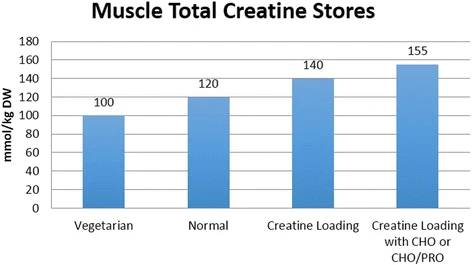Creatine

Does this mean vegetarians have lower creatine levels?
Even though some people do not eat meat and other animal products, studies do not show lower levels of creatine in the brain in the vegetarian population. However, muscle creatine proved significantly lower – up to 70%.
Creatine supplementation:
Creatine research began in 1982. Several forms of creatine have been created, but creatine monohydrate is still the gold standard. It could be said that all other forms of creatine do not have a greater benefit, although we cannot say this for sure because studies on other forms of creatine do not compare them to creatine monohydrate.
Creatine is a very safe supplement and it is advisable to supplement it with 3-5g per day, in athletes for performance and in the elderly for a potentially positive effect on thinking.
For muscle creatine, it’s best to take it after a workout, but the timing doesn’t play a big role in principle.
Sources:
- Kaviani M, Shaw K, Chilibeck PD. Benefits of Creatine Supplementation for Vegetarians Compared to Omnivorous Athletes: A Systematic Review. International Journal of Environmental Research and Public Health. 2020; 17(9):3041. https://doi.org/10.3390/ijerph17093041
- Kreider, R.B., Kalman, D.S., Antonio, J. et al. International Society of Sports Nutrition position stand: safety and efficacy of creatine supplementation in exercise, sport, and medicine. J Int Soc Sports Nutr 14, 18 (2017). https://doi.org/10.1186/s12970-017-0173-z
- Fazio, Carly et al. “Efficacy of Alternative Forms of Creatine Supplementation on Improving Performance and Body Composition in Healthy Subjects: A Systematic Review.” Journal of strength and conditioning research vol. 36,9 (2022): 2663-2670. doi:10.1519/JSC.0000000000003873
- Kreider RB, Stout JR. Creatine in Health and Disease. Nutrients. 2021 Jan 29;13(2):447. doi: 10.3390/nu13020447. PMID: 33572884; PMCID: PMC7910963.
